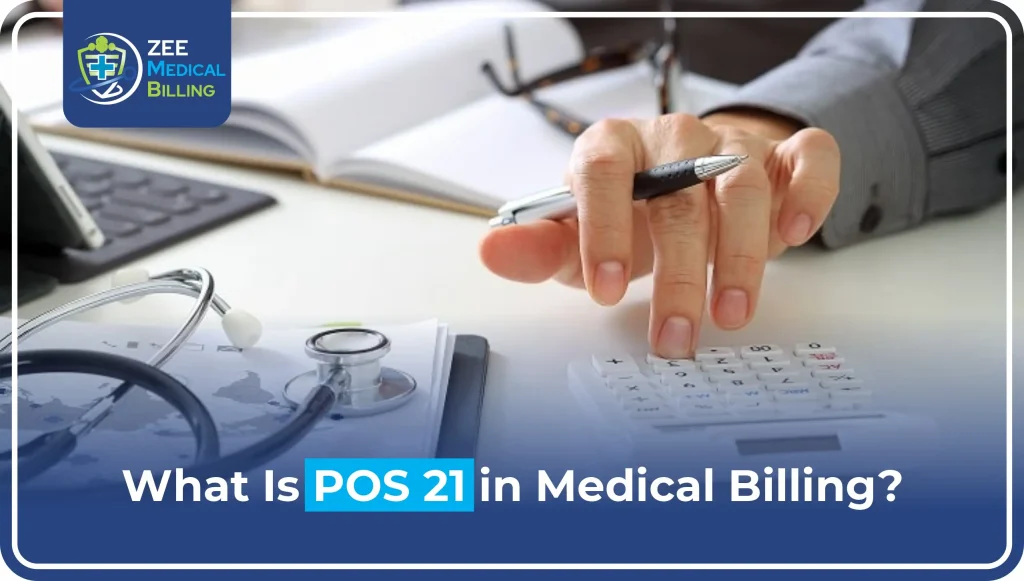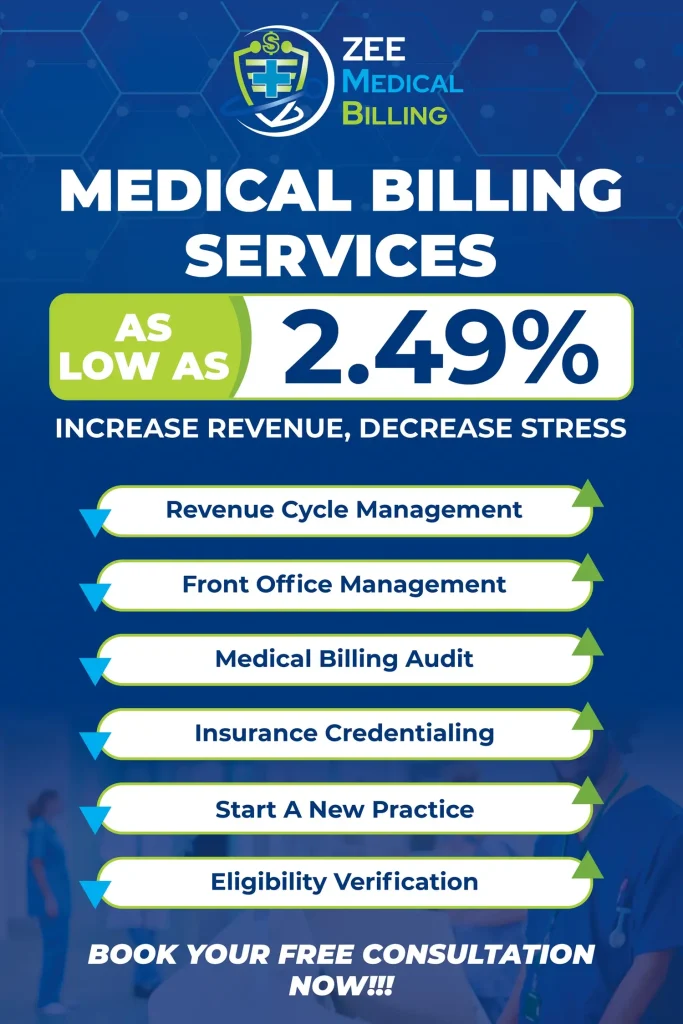In the world of healthcare billing, understanding various codes is essential for smooth claim processing and insurance reimbursements. One such crucial set of codes is the Place of Service (POS) code. These codes identify where a medical service provider delivered care, which helps insurance companies determine the correct reimbursement rate.
POS 21, or Place of Service 21, refers explicitly to services delivered in an Inpatient Hospital setting. In this guide, we will look at what POS 21 means. We will also see how medical billing uses it. Finally, we will discuss why it is important for healthcare providers and insurance payers.
What Is POS 21 in Medical Billing?
POS 21 means Place of Service code 21. This code serves medical services provided in an inpatient hospital. This code shows that the patient received treatment as an inpatient admitted to a hospital on claims.
This code is important for processing insurance claims. It helps distinguish between inpatient and outpatient services, which receive different payments. When you submit the correct POS code, you ensure that the system processes claims efficiently and keeps payments accurate.
Also Read: What Is a Superbill in Medical Billing? Full Guide
POS Code 21: Official Definition
According to the Centers for Medicare and Medicaid Services (CMS), the official definition of POS 21 is:
“A facility, other than psychiatric, which primarily provides diagnostic, therapeutic (both surgical and non-surgical), and rehabilitation services by or under the supervision of physicians to patients admitted for a variety of medical conditions.”
This definition shows that POS 21 is only for inpatient hospital care. It does not include emergency room visits or outpatient services.
Key Characteristics of POS 21
| Feature | POS 21 (Inpatient Hospital) |
| Location | Hospital facility |
| Patient Status | Admitted inpatient |
| Duration of Stay | Usually more than 24 hours |
| Billing Complexity | Higher due to extended services |
| Reimbursement Rate | Generally higher than outpatient services |
| Services Covered | Diagnostics, surgery, rehab, and more |
When Is POS 21 Used?
Providers use POS 21 when they give services to a patient who is admitted to the hospital. This can include:
- Post-surgical care
- Ongoing treatment for chronic illness
- Diagnostic tests requiring observation
- Extended rehabilitation
- Recovery from major illness or injury
The key qualifier is that the patient must admit themselves, not just visit for a quick procedure or checkup.
Importance of POS 21 in Medical Billing
1. Accurate Insurance Reimbursement
Using the right POS code helps the insurance company understand the treatment setting and scope. This directly affects how much they will reimburse.
2. Claim Approval and Processing Speed
Incorrect or missing POS codes can lead to claim rejections or delays. Including POS 21, when applicable, helps streamline the billing process.
3. Regulatory Compliance
Healthcare billing is strictly regulated. Using POS codes like POS 21 correctly helps follow federal billing rules. This is important when working with Medicare or Medicaid.
How Does POS 21 Differ from Other POS Codes?
| POS Code | Description | Setting | Patient Admitted? |
| 11 | Office | Physician’s office | No |
| 22 | Outpatient Hospital | Hospital outpatient department | No |
| 23 | Emergency Room – Hospital | ER department | No |
| 21 | Inpatient Hospital | Hospital (admitted patients) | Yes |
POS 21 is special because it applies only to patients that hospitals admit. This sets it apart from outpatient services and emergency visits.
Also Read: RHC and FQHC Billing Guidelines You Should Know
Role of POS 21 in Medicare and Medicaid Claims
POS 21 is especially significant for Medicare and Medicaid billing. These programs have specific rules and payment schedules based on POS codes. Submitting claims with the correct POS ensures proper processing within these government programs.
Medicare typically reimburses more for inpatient services because of the intensity and resource use involved in those settings.
Common Mistakes When Using POS 21
- Using POS 21 for Emergency Room Visits: ER visits usually fall under POS 23.
- Applying POS 21 to Observation Stays: Observation status is not the same as admission; this is often coded with POS 22.
- Missing Admission Documentation: The patient must be officially admitted for POS 21 to apply.
To avoid denials, healthcare providers must ensure correct use based on actual patient status and facility documentation.
FAQs
1. What does POS 21 mean in medical billing?
POS 21 refers to inpatient hospital care. People use it on claims to show that the service happened in a hospital. The hospital admitted the patient for care, usually for more than 24 hours.
2. How is POS 21 different from POS 22 or POS 23?
POS 21 indicates inpatient care. POS 22 serves outpatient care in a hospital setting, and POS 23 provides emergency room services. The key difference is whether the hospital admitted the patient.
3. Why is POS 21 necessary for reimbursement?
Insurance payers determine reimbursement based on the location of the care. Inpatient hospital services (POS 21) usually get higher payment rates. This is because the care is complex and costly.
4. Can POS 21 be used for outpatient services provided in a hospital?
No. POS 21 is strictly for services rendered during an inpatient admission. Outpatient services, even if done in a hospital, require POS 22.
5. How can billing errors with POS 21 be avoided?
Providers should confirm admission status, check medical documentation, and cross-reference with payer guidelines. Using billing software with POS validation features can also reduce errors.
Conclusion
Understanding the Place of Service 21 (POS 21) code is essential for accurate and compliant medical billing. It lists the services given during a patient’s hospital stay. This detail greatly impacts the processing and payment of claims.
If you are a healthcare provider or a billing specialist, using POS 21 correctly helps get claims approved faster. It also ensures accurate payments and meets regulatory standards.
At Zee Medical Billing, our goal is to simplify complex billing topics and provide clear, trustworthy information. We do not provide coding services. However, we dedicate ourselves to making medical billing concepts easier for everyone involved.
Need Expert Medical Billing Services?
Zee Medical Billing provides professional billing solutions tailored to healthcare providers across the United States. In addition to offering top-tier support from our main office, we proudly serve clients in Illinois, Indiana, California, Kentucky, New York, Washington, Georgia, Alabama, South Carolina, Texas, Pennsylvania, Ohio, New Hampshire, Nevada, Massachusetts, Hawaii, Arizona, and Colorado! Whether you’re looking to streamline your revenue cycle or improve claims accuracy, you can reach out to us to learn more about how we can support your practice.









